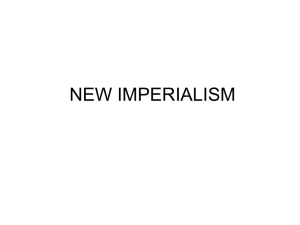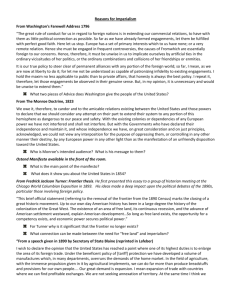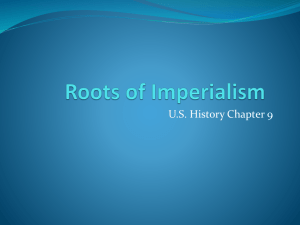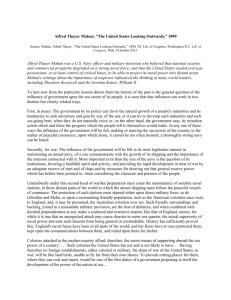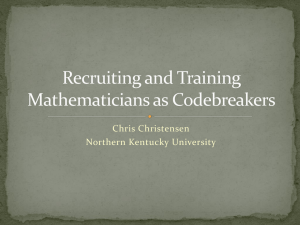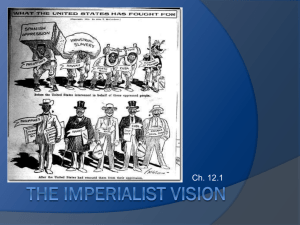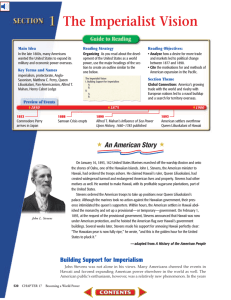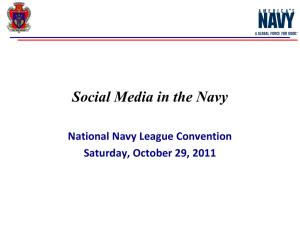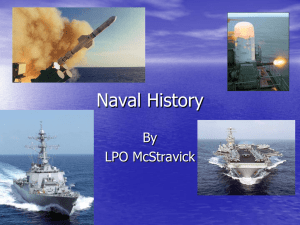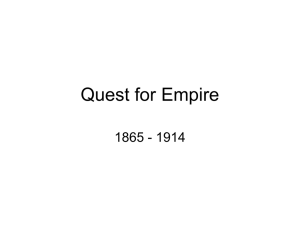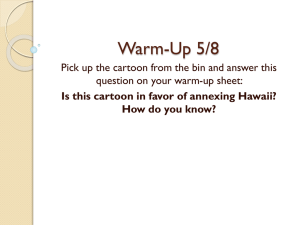Becoming a World Power
advertisement
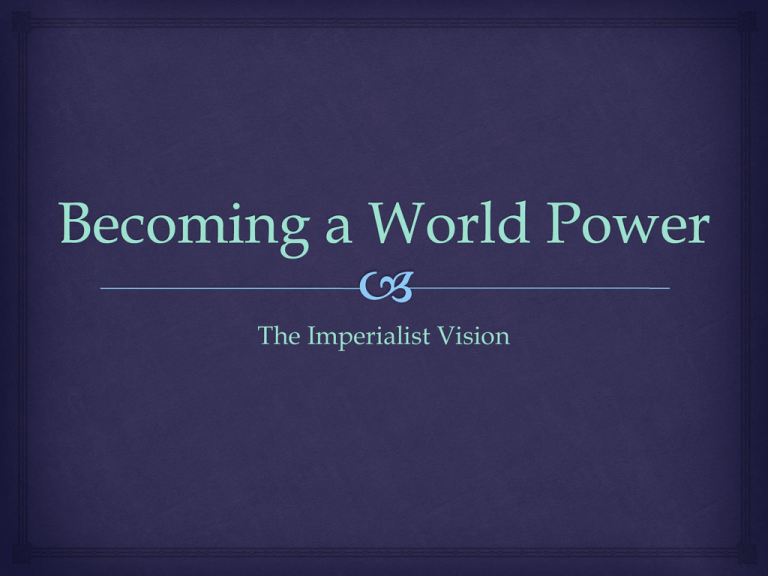
The Imperialist Vision Learning Targets You will be able to: Understand that Europe had ambitions toward expansion and imperialism in the late 1800s. Know the effect of tariffs on trade Define and/or identify protectorate, Anglo-Saxonism, PanAmericanism, the Commercial Bureau of the American Republics, and the Organization of American States Know what Josiah Strong, Matthew C. Perry, President Franklin Pierce, Queen Liliuokalani, James G. Blaine did Describe the relationship between planters and Hawaiians Understand the causes and effects of Hawaii’s economic tailspin Know what a customs union would require Tell why Americans wanted a strong Navy Describe the effects of Alfred T. Mahan’s book Explain the economic, cultural, and military factors that were fueling U.S. imperialist policy in the 1880s. Building Support for Imperialism -A Desire for New Markets The Europeans embarked upon a policy of expansion and imperialism. Imperialism is the economic and political domination of a strong nation over other weak nations. By the late 1800s, high tariffs reduced trade between industrial countries. These high tariffs forced companies to find other places to sell their products and invest in industries in other countries. To protect investments, European nations exerted control over those other countries. The local rulers usually had to accept advice from the Europeans on how to govern their countries. Building Support for Imperialism -A Feeling of Superiority The United States followed European expansionist ideas when European industries found success. The U.S. had a duty to shape “less civilized” areas. Josiah Strong, linked Anglo-Saxonism to Christian missionary ideas. Expansion in the Pacific -Perry Opens Japan Matthew C. Perry to take a naval expedition to Japan to negotiate a trade treaty. President Franklin Peirce sent a naval expedition to Japan to force Japan to trade with the U.S. Japan quickly became “westernized” and built a strong navy and eventually set out to create its own empire in Asia. Expansion in the Pacific -Annexing Hawaii Tensions between the planters and the Hawaiians mounted. As sales of Hawaiian sugar declined, the islands economy went into a tailspin. In 1891 Queen Liliuokalani ascended the Hawaiian throne and tried to re-establish the thrones power over Hawaii Faced with the economic crisis and the queen’s actions, the planters backed an attempt to overthrow the monarchy. Trade and Diplomacy in Latin America American business leaders wanted to increase the sale of American products in South America. Blaine proposed the United States invite the Latin American nations to a conference in Washington, D.C. The idea that the United States and Latin America should work together came to be called Pan-Americanism. He wanted a customs union that would require all of the American nations to reduce their tariffs. Blaines ideas were rejected but the Commercial Bureau of the American Republics was created. (Worked to promote cooperation among North and South America) This organization was later known as the Organization of American States. Building a Modern Navy Support for building a large modern navy, supporters argued that if the United States did not build up its navy and acquire bases overseas, it would be shut out of foreign markets by the Europeans. Captain Alfred T. Mahan, an officer in the U.S. navy published his lectures in a book called “The Influence of Sea Power Upon History”, 1660-1783. Mahan’s book became a best-seller, and it helped to build public support for a big navy. Review Questions What did European nations want in the late 1800s? How was trade effected by tariffs? Define and/or identify protectorate, Anglo-Saxonism, PanAmericanism, the Commercial Bureau of the American Republics, and the Organization of American States. What did Josiah Strong, Matthew C. Perry, President Franklin Pierce, Queen Liliuokalani, James G. Blaine do? What was the relationship between planters and Hawaiian’s ? What were the causes and effects of Hawaii’s economic tailspin? What would a customs union require? Why did Americans wanted a strong Navy? What were the effects of Alfred T. Mahan’s book? Essay Question Explain the economic, cultural, and military factors that were fueling U.S. imperialist policy in the 1880s. Essay Answer Explain the economic, cultural, and military factors that were fueling U.S. imperialist policy in the 1880s. Economic and military competition from other nations, as well as a growing feeling of cultural superiority, led the shift in American opinion toward imperialism. Several European nations were expanding their power overseas, forming colonies and protectorates to protect their new markets and investments in other nations. In the United States, the Western frontier was filling up, and many Americans concluded that the nation had to develop new overseas markets to keep its economy strong. Influential author Alfred T. Mahan argued that the United states needed to build a large navy to protect its merchant ships and to defend its right to trade with other countries. To support the navy, the United States had to acquire territory for overseas bases. At the same time, many Americans began to believe in Anglo-Saxonism—the idea that English-speaking nations had superior character, ideas, and systems of government, and were destined to dominate the planet.
